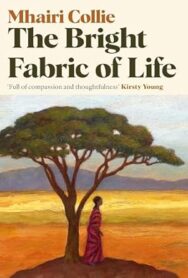‘Joshua in the Sky is more than just a memoir of grief and guilt.’
David Robinson looks at two books that give voice to health conditions that don’t have much of a profile, despite their devastating effects. He hopes these books can bring about awareness and action.
Joshua in the Sky: A Blood Memoir
By Rodge Glass
Published by Taproot Press
The Bright Fabric of Life
By Mhairi Collie
Published by Maclean Dubois
To paraphrase Alasdair Gray’s famous quote about cities, there are some illnesses and disorders that we know about because writers and artists have imagined them. Florence, Paris, London and New York are as over-represented in paintings, novels, and films just as tuberculosis, cholera and AIDS have been at various stages in cultural history.
But what about the medical disorders that no writers and artists have yet tried to describe? What kind of impact will books about them make when they are written about for the first time? How can they give contours and heft to afflictions readers won’t know about?
Unusually, this month we have two examples, both by small Scottish presses, both dealing with medically traumatic subjects, albeit in completely different ways.
In Joshua in the Sky, Rodge Glass memorializes his nephew, who died in 2017 from HHT (Hereditary haemorrhagic telangiectasia), a genetic mutation which causes blood vessels to form abnormally. At its worst, this can affect organs such as the brain, liver and lungs. That’s what happened with Joshua, who only lived for three hours outside the womb.
I’d never heard of HHT. Most people haven’t, though apparently it affects some 1.4 million people worldwide. Glass, who has suffered from nosebleeds all his life, hadn’t heard of it either, nor had anyone in the rest of his immediate family, some of whom also had it. Although recurrent nosebleeds are a common indicator of HHT, many people who have it – Joshua’s father, Glass’s brother, is a prime example – might not have any symptoms at all.
Because Glass blames himself for not knowing about HHT, guilt is veined throughout the book. If only he had checked out why he got all those nosebleeds and been diagnosed with HHT, he tells himself, he would have been able to tell Joshua’s parents and his nephew, whose lungs couldn’t work because of it, would have been able to breathe. It’s all, he is convinced, his fault.
Except of course it’s not. When he apologises to Joshua’s mother, she is understanding. So too is his brother, who not only doesn’t blame him but doesn’t even understand why Glass thought it could be his fault in the first place. ‘Nothing would have been different, he says, without a trace of anger in his voice.’
That’s the voice of sanity. All through the truly horrendous chapter in which Glass describes one of his HHT episodes, blood pouring out of him in the bathroom in the middle of the night, blood all over the bathroom floor and walls, arms scratched to ribbons, fists rammed into his eye sockets, that’s exactly what the reader is thinking too: that Joshua’s death is not Glass’s fault. Because how can you act on what you don’t know?
Joshua in the Sky is more than just a memoir of grief and guilt. Because Glass reads to an almost pathological extent (often while walking), the story is threaded with texts – most of them refreshingly unpredictable – which mean a lot to him and reflect his various states of mind as he tries to make sense of his nephew’s death. And though as a writer he is still probably best known as Alasdair Gray’s biographer, he devotes the same attentiveness to describing the sadly much smaller life of his nephew, while also melding it with his own and those of his own adored daughters.
In that project, the rage subsides, but doesn’t disappear. Months after HHT had left Joshua’s lungs unable to work, he and Joshua’s parents took tests at the London office of a specialist in the condition. ‘”What happened to Joshua is so rare,” she tells them. “Butterfly-on-your-chopsticks rare. There’s no making sense of it.”’ And yet Joshua died and if you search online at curehht.org you’ll find other people who have also lost children to HHT. ‘”Who the hell,” he asks of the specialist, “does she think she is?”’
Now, let me introduce you to Edinburgh colorectal consultant Mhairi Collie. If Glass’s is the first HHT memoir, Collie’s debut novel The Bright Fabric of Life is surely the first to deal with repairing fistulae in Ethiopia. As with HHT, my knowledge of fistulae is minimal, so allow me to explain.
In much of the third world, women give birth far away from hospitals or medical care. According to World Health Organisation figures, in 300,000 cases the mother will die in childbirth. The same vast number – think of it as a three planeloads a day – will survive, but with life-altering injuries caused during labour. These women will be left incontinent, unable to work, possibly hidden away as embarrassment to their families, probably abandoned by their partners. In the absence of running water or sanitary pads, their lives will become an odorous hell, with fistulae leaking for the rest of their lives.
You or I can, I think, be forgiven from not knowing about these 300,000 women. Collie herself was 30 and had nearly finished her surgical training before she found out that they existed in anything like those numbers. When she did, she was working in an MSF hospital for refugees near Ethiopia’s northern border with Eritrea. She wanted to learn more, so she went to a fistula clinic in Addis Ababa to find out how to, in layman’s terms, mend gynaecologically-damaged women.
Three weeks at the fistula clinic in the Ethiopian capital in 2000 changed her life. Though she went back to work in the UK, she didn’t forget those incontinent African women, and knew exactly what she’d do to help them. She co-founded a charity where it seemed to be needed most – Uganda, she thought – in 2003. They built up a team of UK-based and African doctors and nurses, the Africans gradually taking over with time. As, with better healthcare, Ugandan women’s childbirth injuries became less severe, they focussed their efforts on prevention instead of treatment and moved on to other countries – Malawi, Sierra Leone, Madagascar – where they were needed even more.
Since then, there have only been a couple of years – when her children were very young - when Collie hasn’t spent around half of her annual leave working – unpaid – for her charity, Ugandan Childbirth Injury Fund. This year alone she has already worked in fistula clinics in the bush in Uganda, Madagascar, with Sierra Leone and another trip to Uganda still to come. Each week, they treat 30 or 40 women. The success rate per operation – each of which costs only £250 – is high.
Mhairi Collie explores these flashes of hope amid despair in her debut novel, The Bright Fabric of Life, which is published this month – ‘A fine novel,’ in the words of Sir Alexander McCall Smith on its back cover, ‘that will linger long in the mind – and in the heart of the reader’.
‘Essentially,’ says Collie, ‘it’s a medical romance set in a remote part of Africa that is just emerging from war. The romance bit is made up, but the medical aspects – the landmine injuries, and of course the women’s childbirth injuries, are all based on things I’ve seen.’ All the money the novel raises will go to fistula work via the Uganda Childbirth Injury Fund (www.ucif.co.uk) and the Fistula Foundation.
My own connection with Collie is almost as close as Glass’s with Joshua. Before I met her for the first time, I had bowel cancer, and afterwards I didn’t. It’s not just planeloads of women who owe her.
Joshua in the Sky by Rodge Glass is published by Taproot Press, priced £14.99.
The Bright Fabric of Life by Mhairi Collie is published by Maclean Dubois, priced £12.99.
ALSO IN THIS ISSUE

 Nocturne by Christopher Rush
Nocturne by Christopher Rush
‘It was no lie. We were all sorry. The whole world had lost him. And the whole world had come to mou …

 David Robinson Reviews: Joshua in the Sky and The Bright Fabric of Life
David Robinson Reviews: Joshua in the Sky and The Bright Fabric of Life
‘Joshua in the Sky is more than just a memoir of grief and guilt.’














